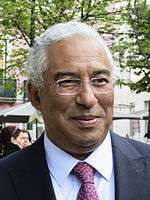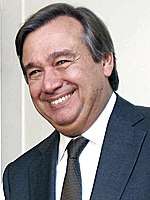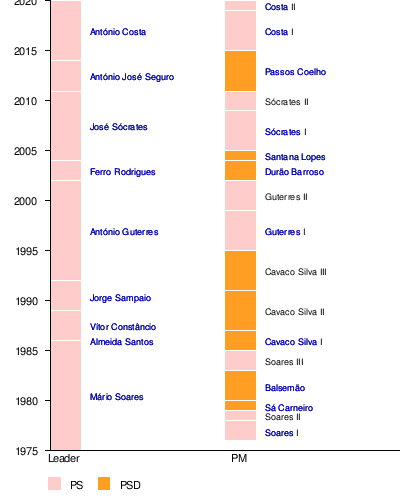Socialist Party (Portugal)
The Socialist Party (Portuguese: Partido Socialista, pronounced [pɐɾˈtiðu susiɐˈliʃtɐ], PS) is a social-democratic[5] political party in Portugal. It was founded on 19 April 1973 in the German city of Bad Münstereifel by militants from the Portuguese Socialist Action (Portuguese: Acção Socialista Portuguesa).
Socialist Party Partido Socialista | |
|---|---|
.svg.png) | |
| Abbreviation | PS |
| President | Carlos César |
| Secretary-General | António Costa |
| Founder | Mário Soares |
| Founded | 19 April 1973 |
| Legalized | 1 February 1975[1] |
| Preceded by | Acção Socialista Portuguesa |
| Headquarters | Largo do Rato 2, 1269–143 Lisbon |
| Newspaper | Acção Socialista |
| Student wing | Estudantes Socialistas |
| Youth wing | Socialist Youth |
| Women's wing | Departamento Nacional das Mulheres Socialistas |
| Membership (2020) | 72,744[2] |
| Ideology | Social democracy[3] |
| Political position | Centre-left |
| European affiliation | Party of European Socialists |
| International affiliation | Progressive Alliance Socialist International |
| European Parliament group | Progressive Alliance of Socialists and Democrats |
| Trade union affiliation | General Union of Workers |
| Colours | Red (official) Pink (customary) |
| Anthem | "Socialism in Freedom" |
| Assembly of the Republic | 108 / 230 |
| European Parliament | 9 / 21 |
| Regional Parliaments | 49 / 104 |
| Local government | 160 / 308 |
| Party flag | |
.svg.png) | |
| Website | |
| ps.pt | |
The PS is one of the two major parties in Portuguese politics, its rival being the centre-right Social Democratic Party (PSD). The current leader of the PS is António Costa, the Prime Minister of Portugal. The party has currently 108 of 230 seats in the Portuguese Parliament following the October 2019 election, forming a minority government.
PS is a member of the Socialist International, Progressive Alliance and Party of European Socialists, and has nine members in the European Parliament within the Socialists & Democrats (S&D) Group during the ninth parliament.
History

Inspired by May 68,[6] the Socialist Party (PS) was created at a conference of Portuguese Socialist Action (ASP), at that time in exile, on 19 April 1973, in Bad Münstereifel in West Germany. The twenty-seven delegates decided to found a party of socialism and freedom, making an explicit reference to a classless society and without Marxism, redesigned as a source of principal inspiration.
On 25 April 1974, the Carnation Revolution brought down the authoritarian regime of the Estado Novo, established in 1933, and democracy was restored. The general secretary of the PS, Mário Soares, returned to Portugal after being in exile in France, and became Minister of Foreign Affairs, and António de Almeida Santos was appointed Minister of Interjurisdictional Coordination in one of the first provisional governments.
After the Revolution, elections were called for 25 April 1975 and the Socialist Party (PS) won the 1975 election for the Constituent Assembly and the 1976 elections for the National Assembly, then losing to the Democratic Alliance (AD) in the 1979 legislative election.
In 1980, the PS made an electoral alliance called the Republican and Socialist Front (FRS), between the Independent Social Democrats (ASDI), led by Sousa Franco, and the Leftwing Union for the Socialist Democracy (UEDS), led by Lopes Cardoso. The alliance failed to defeat the AD.
They won the 1983 general election, but without an absolute majority, the Socialists formed a grand coalition with the centre-right Social Democratic Party (PSD), creating a "Central Block". The new government began negotiations for Portugal to enter the European Economic Community (EEC). In 1985 the Central Block broke down and the PS at the time led by Almeida Santos, lost the 1985 legislative election. Cavaco Silva's PSD won the 1985 elections and again in 1987 and 1991 with absolute majority. The PS was in opposition for more than ten years.
In the 1995 legislative election, the Socialist Party, then led by António Guterres, won a general election for the first time in twelve years, and in the 1999 election failed to obtain what would have been an historic absolute majority for the party by only one MP. In 2001, after a massive defeat in the 2001 local elections, António Guterres resigned as Prime Minister and called for new elections in 2002. The Socialist Party lost the 2002 general election by a small margin to the PSD, who formed a coalition government with the People's Party (CDS–PP). During this time, it has been argued that the Socialist Party moved towards the center and adopted the Third Way.[7][8]
In June 2004, the PS won the 2004 European elections by a landslide, and a few weeks later, Durão Barroso, leader of the PSD and Prime Minister, resigned to become President of the European Commission. In December 2004, Jorge Sampaio, President of the Republic, called fresh elections for February 2005. These elections resulted in a landslide victory for the PS, winning for the first time since its foundation an absolute majority. José Sócrates, leader of the PS, became Prime Minister.
In 2009, after four-and-a-half years in power, the PS lost the 2009 European Parliament elections to the PSD. However, they won the general election held on 27 September 2009, but failed to renew the absolute majority they won in the previous general election. The PS later introduced and legislated same-sex marriage.
The financial crisis of 2011 hit Portugal very hard, prompting Sócrates' government to impose harsh austerity measures. On 23 March 2011, the entire opposition in Parliament said no to new measures proposed by the government. As a result of this, José Sócrates resigned as Prime Minister and a snap election took place on 5 June 2011.
In the elections, the PS suffered a huge setback, with 28.1% of the vote, ten points behind the PSD, who formed another coalition government with the CDS-PP. Sócrates resigned as General Secretary on election night after the PS's worst result since 1987. On 23 July 2011, António José Seguro was elected as Sócrates' successor.
The PS, under the leadership of Seguro, won the 2013 local elections making significant gains over the PSD and the Socialists again won the European elections on May 2014 but this time only just. They won 31.5% of the vote against the almost 28% of the alliance between the PSD and CDS-PP. The result was considered quite a disappointment to many Socialist party members and supporters and on 27 May António Costa, the then mayor of Lisbon, announced that he would stand for the leadership of the Socialist Party.[9] António José Seguro refused to call a new congress and leadership election and instead called for a primary election, to be held on 28 September, to elect the party's candidate for Prime Minister in the 2015 general elections.[10] António Costa, being endorsed by the left faction of the party and by people like Mário Soares, Ana Catarina Mendes and Pedro Nuno Santos easily defeated António José Seguro, supported by a more moderate/centrist wing of the party, by a 67% to 31% margin.
In the 2015 legislative elections, the PS polled a disappointing second place, capturing just 32% of the votes against the 38.6% of the PSD/CDS-PP electoral alliance Portugal Ahead. Despite the victory of the PSD/CDS-PP coalition, the centre-left and left-wing parties achieved a clear majority in Parliament. After the second Passos Coelho cabinet fell in Parliament, with the approval of a no-confidence motion, the PS forged a confidence and supply agreement with Left Bloc and Unitary Democratic Coalition to support a PS minority government. For the first time in Portuguese democracy, the leader of the second most voted political force became Prime Minister.
Costa led a very successful first term as Prime Minister with a growing economy, low unemployment and deficit cuts. Although he led a more left leaning PS, in 2018 Costa started to shift the party back to the center, something that a younger and leftier faction, led by the Minister Pedro Nuno Santos, contested.[11] In the 2019 European elections, the PS won a landslide by achieving 33.4%, against the 22% of the PSD. The PS also won the October 2019 general election with 36% of the votes, against the 28% of the PSD, but by a closer margin than expected. The Second Costa cabinet was sworn in on 26 October 2019.
For the 2021 Portuguese presidential election António Costa indirectly endorsed the incumbent Marcelo Rebelo de Sousa, something that made many party members unsatisfied. Former Socialist MEP, Ana Gomes, a critic of Costa and a member of the left faction of the party, is considering a run for the presidency making clear a split inside the party.
Election results
Assembly of the Republic
| Election | Assembly of the Republic | Government | Size | Leader | ||||
|---|---|---|---|---|---|---|---|---|
| Votes | % | ±pp | Seats won | +/− | ||||
| 1975 | 2,162,972 | 37.9% | 116 / 250 |
Constituent Assembly | 1st | Mário Soares | ||
| 1976 | 1,912,921 | 34.9% | 107 / 263 |
Minority gov't[lower-alpha 1] (1976-78) | 1st | |||
| Opposition (1978-79) | ||||||||
| 1979 | 1,642,136 | 27.3% | 74 / 250 |
Opposition | 2nd | |||
| 1980 | w. Republican and Socialist Front | 66 / 250 |
Opposition | 2nd | ||||
| 1983 | 2,061,309 | 36.1% | 101 / 250 |
Central Bloc gov't PS-PSD |
1st | |||
| 1985 | 1,204,321 | 20.8% | 57 / 250 |
Opposition | 2nd | Almeida Santos | ||
| 1987 | 1,262,506 | 22.2% | 60 / 250 |
Opposition | 2nd | Vítor Constâncio | ||
| 1991 | 1,670,758 | 29.1% | 72 / 230 |
Opposition | 2nd | Jorge Sampaio | ||
| 1995 | 2,583,755 | 43.8% | 112 / 230 |
Minority gov't | 1st | António Guterres | ||
| 1999 | 2,385,922 | 44.1% | 115 / 230 |
Minority gov't | 1st | |||
| 2002 | 2,068,584 | 37.8% | 96 / 230 |
Opposition | 2nd | Eduardo Ferro Rodrigues | ||
| 2005 | 2,588,312 | 45.0% | 121 / 230 |
Majority gov't | 1st | José Sócrates | ||
| 2009 | 2,077,238 | 36.6% | 97 / 230 |
Minority gov't | 1st | |||
| 2011 | 1,566,347 | 28.1% | 74 / 230 |
Opposition | 2nd | |||
| 2015 | 1,747,685 | 32.3% | 86 / 230 |
Opposition (2015) | 2nd | António Costa | ||
| Minority gov't[lower-alpha 2] (2015-19) | ||||||||
| 2019 | 1,903,687 | 36.3% | 108 / 230 |
Minority gov't | 1st | |||
European Parliament
| Election | European Parliament | Size | Candidate | ||||
|---|---|---|---|---|---|---|---|
| Votes | % | ±pp | Seats won | +/ | |||
| 1987 | 1,267,672 | 22.5% | 6 / 24 |
2nd | Maria de Lourdes Pintasilgo | ||
| 1989 | 1,184,380 | 28.5% | 8 / 24 |
2nd | João Cravinho | ||
| 1994 | 1,061,560 | 34.9% | 10 / 25 |
1st | António Vitorino | ||
| 1999 | 1,493,146 | 43.1% | 12 / 25 |
1st | Mário Soares | ||
| 2004 | 1,516,001 | 44.5% | 12 / 24 |
1st | António Costa | ||
| 2009 | 946,818 | 26.5% | 7 / 22 |
2nd | Vital Moreira | ||
| 2014 | 1,033,158 | 31.5% | 8 / 21 |
1st | Francisco Assis | ||
| 2019 | 1,106,328 | 33.4% | 9 / 21 |
1st | Pedro Marques | ||
List of important people
_portrait.jpg)


.jpg)

Secretaries-General
- Mário Soares: 19 April 1973 – 29 June 1986
- Almeida Santos (interim): 13 June 1985 – 13 November 1985
- António Macedo (interim): 13 November 1985 – 29 June 1986
- Vítor Constâncio: 29 June 1986 – 15 January 1989
- Jorge Sampaio: 15 January 1989 – 23 February 1992
- António Guterres: 23 February 1992 – 20 January 2002
- Ferro Rodrigues: 20 January 2002 – 24 September 2004
- José Sócrates: 24 September 2004 – 23 July 2011
- António José Seguro: 23 July 2011 – 28 September 2014
- Maria de Belém Roseira (interim): 28 September 2014 – 22 November 2014
- António Costa: 22 November 2014 – present
Party Presidents
- António Macedo: 15 December 1974 – 29 June 1986
- Manuel Tito de Morais: 29 June 1986 – 15 January 1989
- João Ferraz de Abreu: 15 January 1989 – 23 February 1992
- António de Almeida Santos: 23 February 1992 – 9 September 2011
- Maria de Belém Roseira: 9 September 2011 – 22 November 2014
- Carlos César: 22 November 2014 – present
Presidents of the Assembly
- Henrique de Barros: 3 June 1975 – 2 April 1976
- Vasco da Gama Fernandes: 29 July 1976 – 29 October 1978
- Teófilo Carvalho dos Santos: 30 October 1978 – 7 January 1980
- Manuel Tito de Morais: 8 June 1983 – 24 October 1984
- António de Almeida Santos: 31 October 1995 – 4 April 2002
- Jaime Gama: 16 March 2005 – 21 June 2011
- Eduardo Ferro Rodrigues: 23 October 2015 – present
Prime Ministers
- Mário Soares: 23 July 1976 – 28 August 1978; 9 June 1983 – 6 November 1985
- António Guterres: 28 October 1995 – 6 April 2002
- José Sócrates: 12 March 2005 – 21 June 2011
- António Costa: 26 November 2015 – present
Presidents of the Republic
- Mário Soares: 9 March 1986 – 9 March 1996
- Jorge Sampaio: 9 March 1996 – 9 March 2006
See also
Notes
- Coalition government with CDS between January and August 1978.
- Confidence & supply gov't: PS ⇐ (BE–PCP–PEV).
References
- "Partidos registados e suas denominações, siglas e símbolos" Tribunal Constitucional. (in Portuguese)
- São José, Almeida (2 August 2020). "56,75% dos militantes do PS têm mais de 50 anos". Público. Retrieved 2 August 2020.
- Nordsieck, Wolfram (2019). "Portugal". Parties and Elections in Europe. Retrieved 8 October 2019.
- https://observador.pt/2015/07/11/os-hinos-cantavam-nas-primeiras-eleicoes/
- Dimitri Almeida (2012). The Impact of European Integration on Political Parties: Beyond the Permissive Consensus. CRC Press. p. 71. ISBN 978-1-136-34039-0. Retrieved 14 July 2013.
- Varela, Raquel; della Santa, Roberto (4 December 2018). "O Maio de 68 na Europa – Estado e Revolução" [The May of 68 in Europe – State and Revolution] (PDF). Direito e Práxis (in Portuguese). 9 (2): 969–991. doi:10.1590/2179-8966/2018/33600. ISSN 2179-8966.
- Costa Lobo, Marina; Magalhães, Pedro C. (2001). "The Portuguese Socialists and the Third Way" (PDF). European Consortium for Political Research. Retrieved 7 November 2016. Cite journal requires
|journal=(help) - Pearlstein, Steven (6 May 2009). "In Portugal, as in America, a 'Third Way' Is Reemerging". The Washington Post. Retrieved 11 May 2009.
- Nuno, Sá Lourenço (27 May 2014). "António Costa avança para a liderança do PS". Público. Retrieved 4 September 2014.
- Telma, Roque (6 June 2014). "Aprovada a realização de eleições primárias no PS a 28 de setembro". Jornal de Notícias. Retrieved 4 September 2014.
- Ana, Sá Lopes (4 June 2018). "Pedro Nuno ganha batalha e António Costa não gostou". Sol. Retrieved 18 May 2020.
External links
| Wikimedia Commons has media related to Partido Socialista (Portugal). |
- Official Website (in Portuguese)
- Official Website - Featured links (list in Portuguese, links to international websites in English)
- Socialist Internacional
- Party of European Socialists
